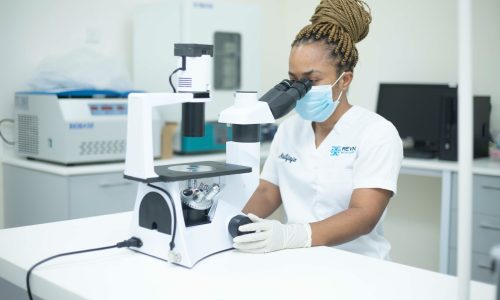Cancer is a global health challenge, affecting millions of lives every year. In recent years, advancements in molecular profiling have revolutionized our understanding of cancer biology and treatment strategies. In the context of Ghana, a country in West Africa, molecular profiling offers tremendous potential to enhance cancer diagnosis, treatment selection, and patient outcomes. This blog explores the significance of molecular profiling in cancer management in Ghana and highlights its impact on the development of personalized or precision medicine.
Molecular profiling involves the analysis of genetic, epigenetic, and protein alterations in cancer cells. By studying these molecular characteristics, researchers can gain insights into the specific mechanisms driving tumor growth, identify potential therapeutic targets, and tailor treatment plans accordingly. Molecular profiling techniques include next-generation sequencing (NGS), gene expression profiling, immunohistochemistry, and DNA methylation analysis.
Cancer poses a significant burden on public health in Ghana, with a rising incidence and mortality rate. Common types of cancer in the country include breast, cervical, prostate, liver, and colorectal cancer. Unfortunately, many cases are diagnosed at advanced stages, limiting treatment options and reducing survival rates. Moreover, conventional chemotherapy and radiotherapy regimens often lack specificity and can lead to unnecessary side effects.
The Role of Molecular Profiling:
- Accurate Diagnosis: Molecular profiling can aid in the accurate diagnosis of cancer, enabling clinicians to distinguish between different cancer subtypes and tailor treatments accordingly. This ensures that patients receive the most appropriate therapy from the outset, improving their chances of a successful outcome.
- Treatment Selection: By analyzing specific genetic alterations in tumors, molecular profiling helps identify targetable mutations and biomarkers. This information is crucial for selecting targeted therapies, immunotherapies, or clinical trials that have shown promising results in specific molecular subgroups. It can also aid in predicting response to treatment and potential adverse events, optimizing patient management.
- Overcoming Drug Resistance: One major challenge in cancer treatment is the development of drug resistance. Molecular profiling can help identify the mechanisms underlying resistance and guide the selection of alternative therapies or combination treatments to overcome it. This approach increases the likelihood of successful treatment and improves long-term outcomes for patients.
- Research and Clinical Trials: Molecular profiling contributes to the advancement of cancer research and the development of innovative therapies. By characterizing the molecular landscape of cancer in Ghana, researchers can identify unique genetic signatures or biomarkers prevalent in the population. This knowledge can facilitate the design of clinical trials tailored to Ghanaian patients, ensuring access to cutting-edge treatments and contributing to global scientific knowledge.
While molecular profiling holds immense promise, several challenges must be addressed for its effective implementation in Ghana:
- Infrastructure and Resources: Establishing advanced molecular profiling facilities and acquiring the necessary equipment can be costly. Adequate funding and infrastructure development are essential to ensure widespread access to molecular profiling technologies across the country.
- Capacity Building: Training healthcare professionals and researchers in molecular profiling techniques is vital for their successful integration into clinical practice. Collaboration with international institutions and knowledge exchange programs can play a crucial role in enhancing local expertise and fostering research collaborations.
- Ethical Considerations: Molecular profiling involves the collection and analysis of sensitive patient data. Implementing robust ethical frameworks and ensuring patient privacy and consent are of utmost importance. This will foster trust among patients and encourage participation in molecular profiling initiatives.
Molecular profiling has the potential to transform cancer management in Ghana by enabling personalized treatment approaches based on a patient’s unique molecular profile. By improving diagnostic accuracy, treatment selection, and overcoming drug resistance, molecular profiling can significantly enhance patient outcomes and reduce the burden of cancer in the country. However, it is essential to address infrastructure,



